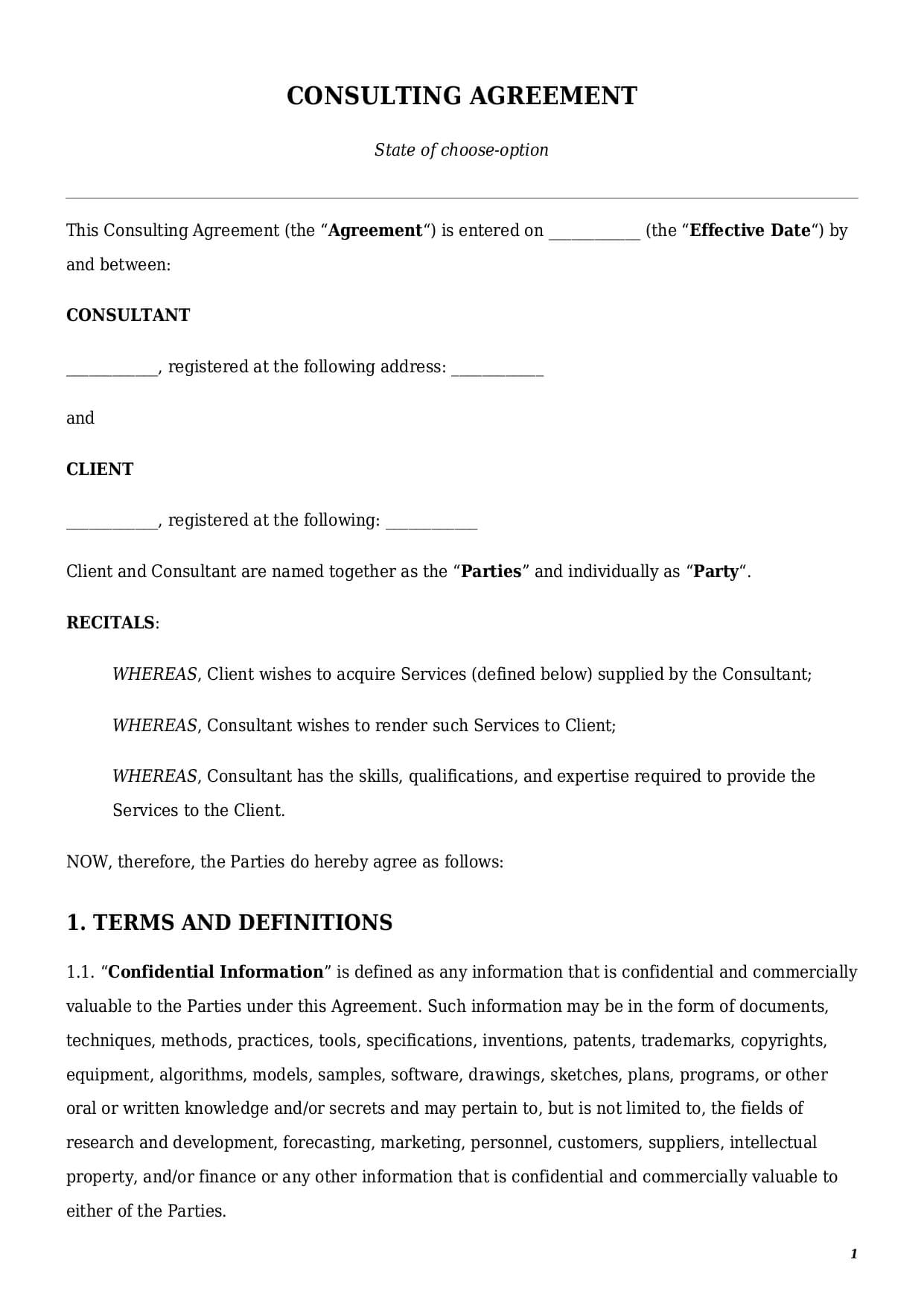Consulting Agreement
Reviews


What is a consulting agreement?
A consulting agreement is a legally binding document that outlines the legal framework under which a consultant provides services to a client. This contract serves to clearly define the expectations and responsibilities of both parties to ensure smooth relationships. A consulting agreement covers the following provisions:
- information about the parties;
- scope of consulting services;
- limitation of liabilities and warranties clauses;
- scope of client’s responsibilities;
- termination clause;
- confidentiality clause;
- non-competition clause; and
- payment terms.
This document is typically used by businesses or individuals to engage external professionals who have expertise and knowledge in certain domains. For instance, it is common to draft a sample consulting agreement for marketing, management, IT, finance, engineering, and human resources consulting services.
The parties involved in a consulting relationship are a client and a consultant. A consultant is usually an independent contractor who could be a self-employed individual or a big consulting firm. A client is a business or individual who needs to hire an external expert in exchange for remuneration.
How to write a simple consulting agreement?
A well-drafted consulting contract agreement template should cover a number of essential clauses to become a valid contract. Those clauses include the following:
Scope of Services
This section describes in detail the list of all consulting services a consultant shall deliver to the client. Apart from that, the parties should lay out the following aspects of their cooperation:
- whether a consultant can engage subcontractors for provision of services;
- whether a consultant should engage only specific employees for provision of services;
- location for provision of services (e.g., client’s office, online);
A good sample consulting agreement should also address a conflict of interest policy. The parties have to define which situations should constitute a conflict of interest and how the parties should act in that case. A standard conflict of interest clause in the consulting agreement allows either party to immediately terminate the existing contract.
Limitation of Liability and Insurance
It is common for a consultant contract agreement to include a limitation of liability and an insurance clause.
A limitation of liability clause lays out a cap on the consultant’s liability in case there is a failure that causes damage or loss to the client. Usually, a consultant’s liability cannot be limited in situations of a death or serious injuries caused to the client or their employees or representatives.
A liability’s cap could be any amount the parties agree to. As a rule of thumb, a liability’s cap is equal to the sum of all monies paid by the client. However, the parties are free to increase or decrease that threshold.
An insurance clause is closely related to the limitation of liability clause above. A consultant might be required to present professional insurance coverage, which could be used to back up their liability under the contract.
Duration of Services
The provision of consulting services is limited in time. The duration of a consulting agreement template should have a completion date. This is a date by which the services should be provided and the final deliverable should be presented to the client.
Final deliverables under a contract could have various forms, including reports, presentations, and guidelines.
Payments
The agreement for consulting services should outline the financial terms. There are a number of components that should be present in the text of a contract:
- type of a consultant’s fee (e.g., a fixed fee, hourly rate, monthly, or annual rate);
- invoicing period;
- acceptable payment methods (e.g., cash, PayPal); and
- late fees (i.e., financial penalties for late payments).
Some consultant agreements may also outline compensation of additional expenses by the client. Those are expenses that are connected to the provision of services, though they are not included in the price. For example, a client might be ready to cover transportation or meals for a consultant’s employees. The coverage of additional expenses could be of different forms:
- unlimited compensation of predefined expenses. In that case expenses that are not agreed in advance are not covered;
- compensation of all additional expenses below a certain weekly or monthly threshold.
Termination
Every consultant agreement template should include a termination clause explaining how and when either party can end the contract.
Parties can terminate a contract by sending a prior written notice to each other. A notice period could usually be between 14 and 30 days depending on the initial length of a contract.
Usually a consultant agreement provides a right for immediate termination once a material breach takes place. A list of grounds for immediate termination is usually limited and may include the following circumstances:
- failure to pay on time;
- breach of conflict of interest policy;
- inability to provide agreed scope of services, etc.
Confidentiality
A confidentiality clause (or non-disclosure clause) ensures that both parties protect sensitive information obtained during the consulting relationship. A well-drafted consulting agreement template should:
- define what is included in the scope of ‘confidential information’
- specify the period of time after the end of the contract within which parties should maintain confidentiality (e.g., 1, 2, or more years)
- define information that should be excluded from the scope of confidential information.
How to customize a consulting agreement at Faster Draft?
In order to get a personalized consultant agreement, follow a few easy steps below:
- Click the button “Create Document.”
- Answer simple questions in the questionnaire.
- Select a document’s format—Consulting Agreement Template in Word or PDF.
- Make a payment.
- Download your customized legal template in seconds.
Table of content
Frequently Asked Questions (FAQ)
-
1. What to look for in a consulting agreement?
Before entering a consultant contract agreement, both parties have to carefully read the contract’s provisions. There are a number of essential elements either party shall pay attention to:
- liability of a consultant (i.e., are there any limitations of their liability and in which circumstances; what is the maximum liability threshold, and if there is insurance).
- penalties for a material breach (i.e., whether a contract provides any late fees or penalties for either of the parties);
- early termination clause (i.e., whether a party has a right for early termination of a contract and in which circumstances);
- a payment clause defining how much, when, and how the payments should be made;
- clear scope of services.
-
2. What is the difference between a consulting agreement and a professional services agreement?
A professional services agreement is a type of legal contract under which a service provider delivers to a client specific professional services (e.g., accounting, legal representation in court, etc.). The services are referred to as professional because a service provider has to possess certain qualifications, knowledge, and, sometimes, a license to be able to provide those services. For instance, a service provider can represent their clients in a court only if they are admitted to the bar.
A consulting agreement is a special type of a professional services agreement that deals with the provision of consulting services. Consulting services refer to guidance, solutions, or advice given to a client in a specific domain or area (e.g., IT, business, etc.).

Looking for something Different?
Start typing to find out our collection of legal documents and contract templates
